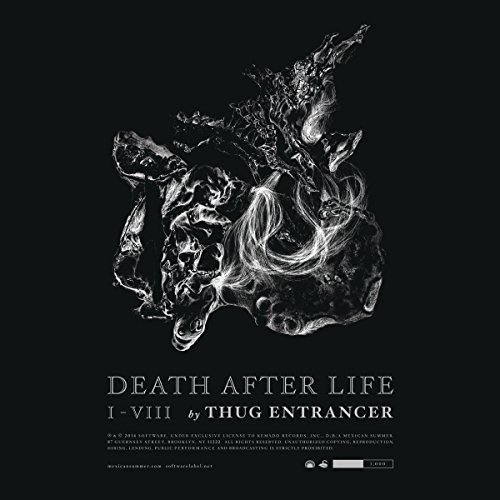
Thug Entrancer
Death After Life
Release Date: Feb 11, 2014
Genre(s): Electronic, House, Techno, Club/Dance, Experimental Techno, Tech-House, Microhouse
Record label: Software
Music Critic Score
How the Music Critic Score works
Buy Death After Life from Amazon
Album Review: Death After Life by Thug Entrancer
Great, Based on 8 Critics
Based on rating 4/5
As in all major genres of music, dance music’s recorded history features dense, granular fragmentation — in part due to writers and listeners delineating categories and boundaries for its various sounds, and in part due to technological breakthroughs, actual rhythmic and textural variations, and artists’ pure search for novelty. For much of its recorded history, the anchor that grounded most of these subgenres was physical space: techno, for instance, developed out of a specific set of artistic identities working and performing together in Detroit in the late 80s and early 90s. Thug Entrancer’s Death After Life works on the archive that is Chicago’s dance music history, covering everything from early techno roots through acid house and finally juke.
Based on rating 8/10
Following a series of online tracks, Chicago-based experimental electronic producer Ryan McRyhew debuted properly with Death After Life I-VIII, a dark suite of abstract techno explorations under the name Thug Entrancer. Constructed from a variety of mostly analog drum machines, synths, and sequencers, the album's shadowy rhythms draw heavily on the influence of early masters of isolated electronic music, as well as picking up on threads borrowed from Chicago's largely obscured juke scene. The snaky hi-hats, rolling snares, bubbling synth arpeggios, and MIDI horns of "Death After Life I" give way to a dubbier feel on the album's second track, calling to mind both Drexciya's underwater ambience and a far more dazed take on the negative space of early-'90s minimal house.
Based on rating 8/10
As CEO of the Laser Palace label and a core member of both Hideous Men and BDRMPPL, Ryan McRyhew was a crucial component of Denver's electronic underground. After relocating to the south side of Chicago, McRyhew embraced his new surroundings, producing a handful of short, footwork-influenced releases under the name Thug Entrancer. The Tropics Mind series featured blissed-out analog synth melodies striding alongside complex drum machine constructions in a manner befitting the work of a veteran Windy City producer.Enter Death After Life, McRyhew's debut for Daniel Lopatin's Software label.
Based on rating 7.6/10
You'd be excused for reading the descriptor "tribute to the music of Chicago's South Side" flown under the banner of a name like Thug Entrancer and, I don't know, shaking your head slowly and knitting your brow, maybe letting out a huff of annoyance. That the musician born Ryan McRyhew started out on a more IDM tip, moved to Chicago from Denver a couple years ago, then moved back out a couple years later, bringing an evangelical enthusiasm for old Trax Records 12" classics back with him? That's the way a lot of super-suspect appropriation nightmares start. But that's also how a lot of engagingly weird cross-genre works happen, and Thug Entrancer's full-length debut album Death After Life—his breakthrough release on Daniel Lopatin's Software label—is more definitively a bold experiment than a cheap jack move.
Based on rating 7.5/10
Who else wants to know what a ‘thug entrancer’ is? The man behind the electronica act, Ryan McRyhew, sure isn’t giving any indication of the story behind his moniker. Maybe it’s some kind of electromagnet for delinquents, or a secretive pheromone that attracts petty criminals. Hmm. Described as the “creative lynchpin in the Denver DIY scene”, McRyhew relocated to Chi-town for his Thug Entrancer project, in order to soak up the burgeoning scenes there and absorb some of the city’s rich dance history.
Based on rating 3.5/5
Thug Entrancer's story is a familiar one by now: American experimental artist discovers dance music and changes his tune. In Ryan McRyhew's case, it was a brief stint in Chicago that got things started. The result is Death After Life, an album that shows an experienced synth wiz channeling a style of dance music indigenous to his adopted home: footwork.
Based on rating 6/10
What can be said about Death After Life, the debut LP by Chicago-by-way-of-Denver’s Thug Entrancer aka Ryan McRyhew? If you look around online, you may get the indication that this is a noir-ish, dark album of throwback electronica, indicative of the Chicago Juke scene and full of 808 rhythms. However, it is really one that can only be determined for as much as its avowal of celestial sounds as much as it throws off the shackles of its netherworld ones. It exists, in a word, in purgatory.
Opinion: Excellent
I still remember the first time I heard the sounds of juke and footwork. The experience was as exhilarating as it was jarring. The music seemed wholly radical, an alien collection of off-angled samples that appeared to jut from no one particular branch of dance music. The sensation was pungent, sharp.
'Death After Life'
is available now

